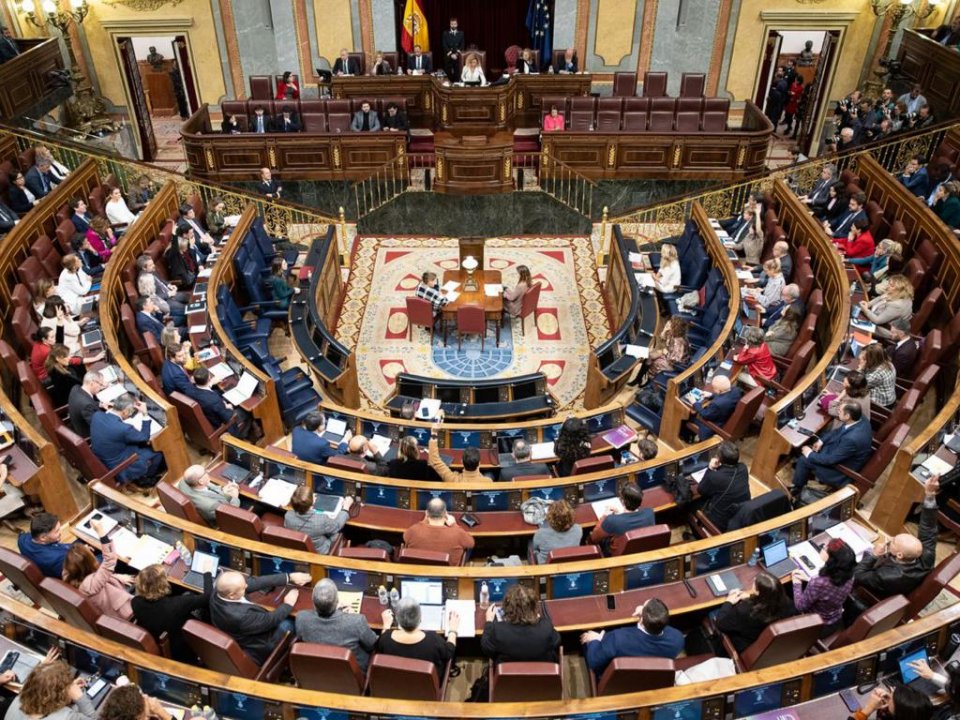Spanish MPs voted on Thursday in favour of a controversial criminal code reform that changes the crime of sedition to ‘aggravated public disorder’, in a move that opposition parties see as the government courting Catalan pro-independence support ahead of next year’s general election.
In addition to changing the crime of sedition, the new legislation seeks to lower the penalty for misuse of public funds. Both charges were used against the Catalan leaders behind the failed October 2017 independence bid.
However, the changes were approved amid an unprecedented situation which saw the right-wing People’s Party (PP) try to block, via judicial appeal, the passage through the Spanish Congress of a measure in the reformed criminal code aimed at easing the appointment of senior judges.
Spain’s top court then convened, delaying the Congress debate, before announcing it would meet again on Monday to decide on the appeal, prompting the PP, the far-right Vox, and Ciudadanos (Cs) to call on Congress to postpone the vote until after the court ruling.
It was initially unclear whether the vote would go ahead or whether the court would rule on a yet-to-be-approved measure, which would have been unprecedented.
‘The right and far-right have today attempted, more or less, to muzzle the Spanish parliament,’ Prime Minister Pedro Sánchez said from Brussels. ‘Democracy will prevail, the Constitution will prevail.’
Finally the debate and vote went ahead. The reform was backed by Spain’s ruling PSOE socialists and their junior coalition partners, the left-wing Podemos group. The Basque parties PNV and EH Bildu, and pro-Catalan independence Esquerra Republicana (ERC) and PDeCAT also voted in favour. Fellow pro-independence Junts per Catalunya (JxCat) and CUP voted against the changes alongside Vox, while the PP and Cs abstained.
The criminal code reform has stirred up fierce opposition not only from Spain’s right-wing opposition but from the ranks of Prime Minister Pedro Sánchez’s own PSOE party.
‘It is unacceptable to strike a bargain with criminals over their own conviction,’ said Emiliano García-Page, the socialist leader of the Castilla-La Mancha region.
Main opposition leader Alberto Núñez Feijóo of the PP said it was ‘unprecedented in a democracy to create a criminal code that was tailor-made for convicts’, accusing Sánchez of losing his ‘legitimacy’ to rule.
Sánchez himself acknowledged at the weekend it was a ‘risky’ move but said there was ‘no other way’ of ‘rescuing Catalonia from crisis’ and promoting ‘coexistence’.
Since becoming premier in June 2018, Sánchez has adopted a strategy of ‘defusing’ the conflict in Catalonia following the failed independence bid which threw Spain into its worst political crisis in decades.
Nine Catalan politicians and activists were eventually jailed for between 9-13 years by the Spanish Supreme Court in October 2019, convicted of sedition and misuse of funds, with the verdicts causing widespread protests across Catalonia. In June 2021, the nine walked free from prison, following the pardons granted by the government led by Sánchez.
Currently, those convicted of misuse of public funds face between two and six years in prison and are banned from public office for six to 10 years.
With aggravated circumstances, that could be extended to between four and eight years of jail, with a ban of 10 to 20 years. Under the new legislation, however, those penalties would be reduced to one to four years behind bars, with a ban of between two and six years.
The legal changes could also soften any future sentence for Carles Puigdemont, the Catalan leader in 2017 who fled abroad with two others to escape prosecution. All three are wanted on charges of sedition and misuse of public funds.
Of the Catalan leaders jailed over the independence bid who were subsequently pardoned, all nine were charged with sedition but only four were convicted of misuse of public funds.
And because sentences can be retroactively modified in Spain if changes to the penal code benefit convicted offenders, it could help the four who are still facing a ban on holding public office.
Concretely, it could allow former Catalan deputy leader Oriol Junqueras, who heads ERC, to return to politics in the coming years.
The reform will now go to the Senate and could be in place by the end of the year.
Click here for all our reports related to Catalan independence.
ALSO READ: Spain to update sedition law to become ‘aggravated public disorder’.
ALSO READ: UN human rights committee says Spain at fault for suspension of Catalan MPs.
ALSO READ: ‘CatalanGate’: politicians, activists accuse Spain of ‘huge & illegal’ spying.
Sign up for the FREE Weekly Newsletter from Spain in English.
Please support Spain in English with a donation.
Click here to get your business activity or services listed on our DIRECTORY.
Click here for further details on how to ADVERTISE with us.


